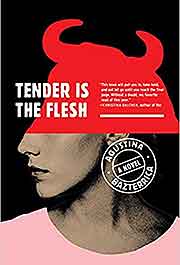 By AGUSTINA BAZTERRICA (Pushkin Press; 2017/20)
By AGUSTINA BAZTERRICA (Pushkin Press; 2017/20)
Another example of literary horror. This means horror that appeals to readers of The New Yorker and The Village Voice, and TENDER IS THE FLESH, translated from the Spanish by Sarah Moses, hits all the literary horror bases: it features a sensitive, angst-ridden protagonist and present-tense prose that’s often downright obnoxious in its “artful” introspection. The novel, however, is still a must-read due to its concept: a future world where a mysterious disease has wiped out nearly all the world’s animals, resulting in the mass harvesting of human flesh for food.
 That’s a metaphor, obviously, for modern man’s self-destructive tendencies, but author Agustina Bazterrica does a thorough, non-satiric job constructing this dystopia. Precise laws are in place as to how the “special meat” of this society is to be handled and who is selected to supply it (societal outcasts, obviously). We also learn about the lawless scavengers who threaten this impeccably ordered system by hijacking meat transport vehicles and leaving mass carnage in their wake.
That’s a metaphor, obviously, for modern man’s self-destructive tendencies, but author Agustina Bazterrica does a thorough, non-satiric job constructing this dystopia. Precise laws are in place as to how the “special meat” of this society is to be handled and who is selected to supply it (societal outcasts, obviously). We also learn about the lawless scavengers who threaten this impeccably ordered system by hijacking meat transport vehicles and leaving mass carnage in their wake.
Some more detail about the particulars of the animal disease that sets everything in motion might have been helpful (because as it is we get very little), but for the most part this a credible piece of world-building. The novel is also, at 179 pages, quite short, one area in which the literary label actually works to its advantage (as opposed to “bestseller” fiction, which generally insists on inflated page lengths).
Another thing: the details of the meat production are disturbingly graphic. This is necessary to the story, which involves Tejo, a buyer for a meat processing plant who feels conflicted about his profession. He grows even more so when his boss “gifts” him a young woman; she’s intended as nourishment, but Tejo, in defiance of the law, keeps her alive in his barn, and inevitably finds himself developing feelings for her.
Tejo certainly has other problems, with a senile father being the most prominent among them. This leads to a lot of mournful contemplation on Tejo’s part that’s meant to offset the gruesomeness—and a lot of chapters, particularly in the final third, that go nowhere. Again, though, the book is short enough to nearly overcome its highbrow pretentions, with the overall impression being that of a short, sharp, complacency-shattering kick in the gut. Good.
